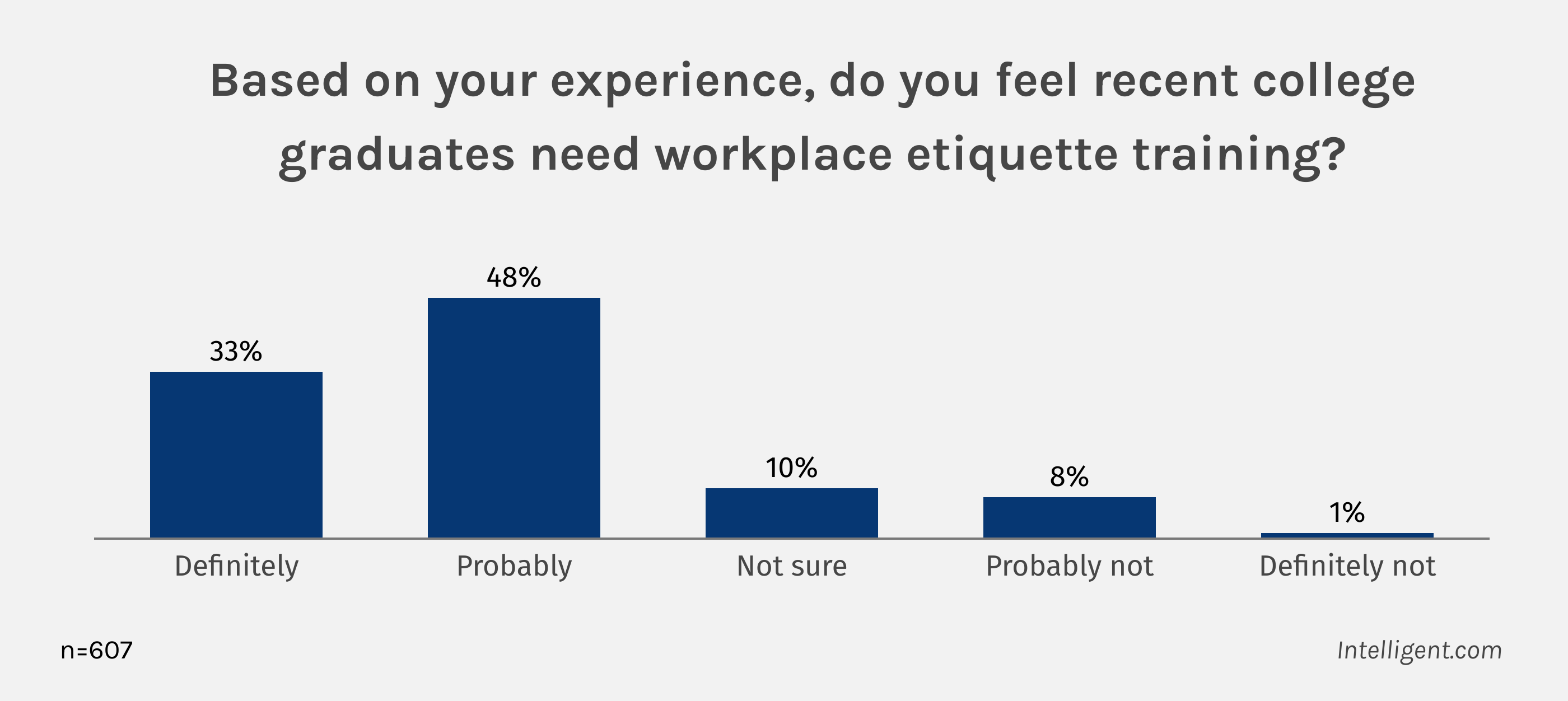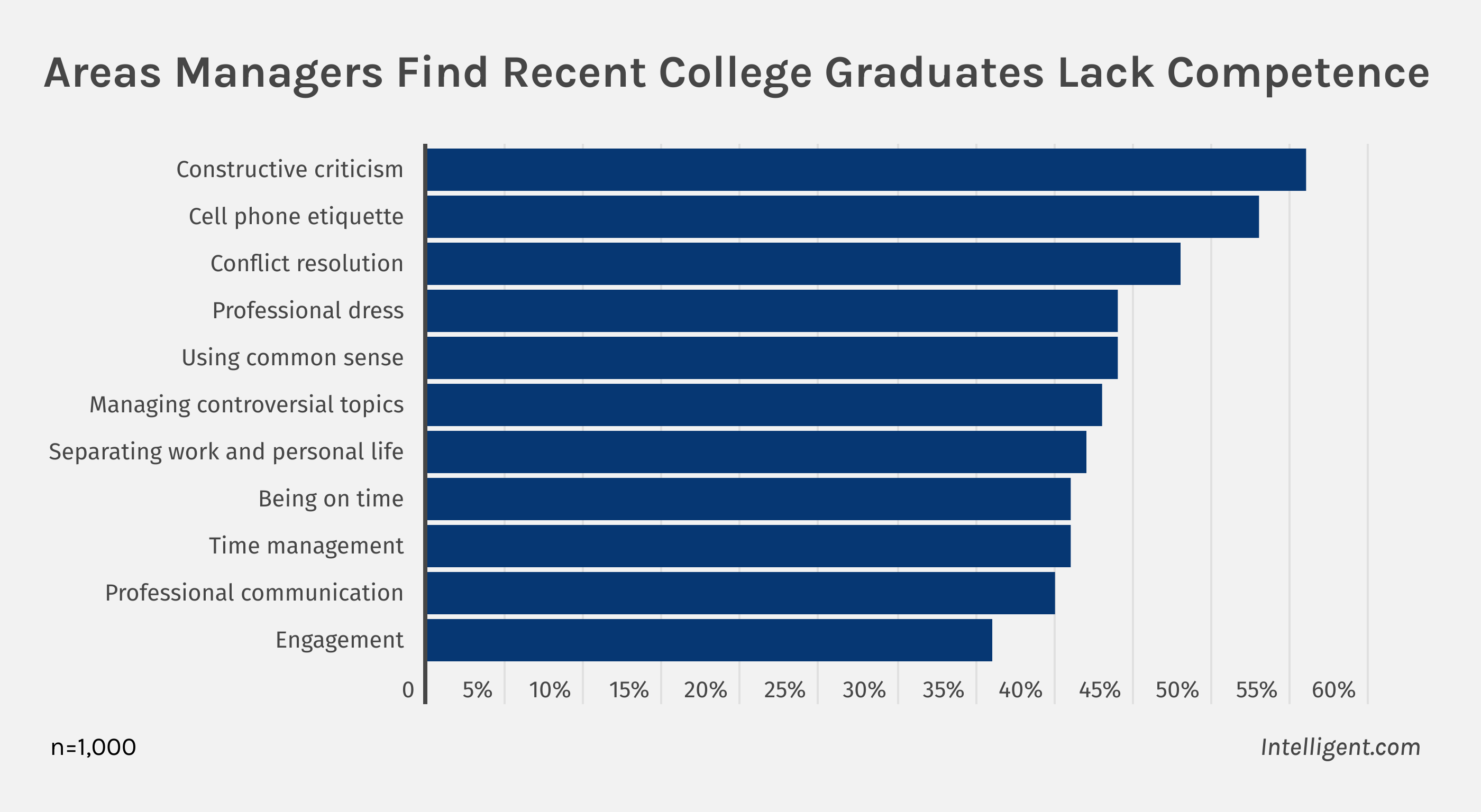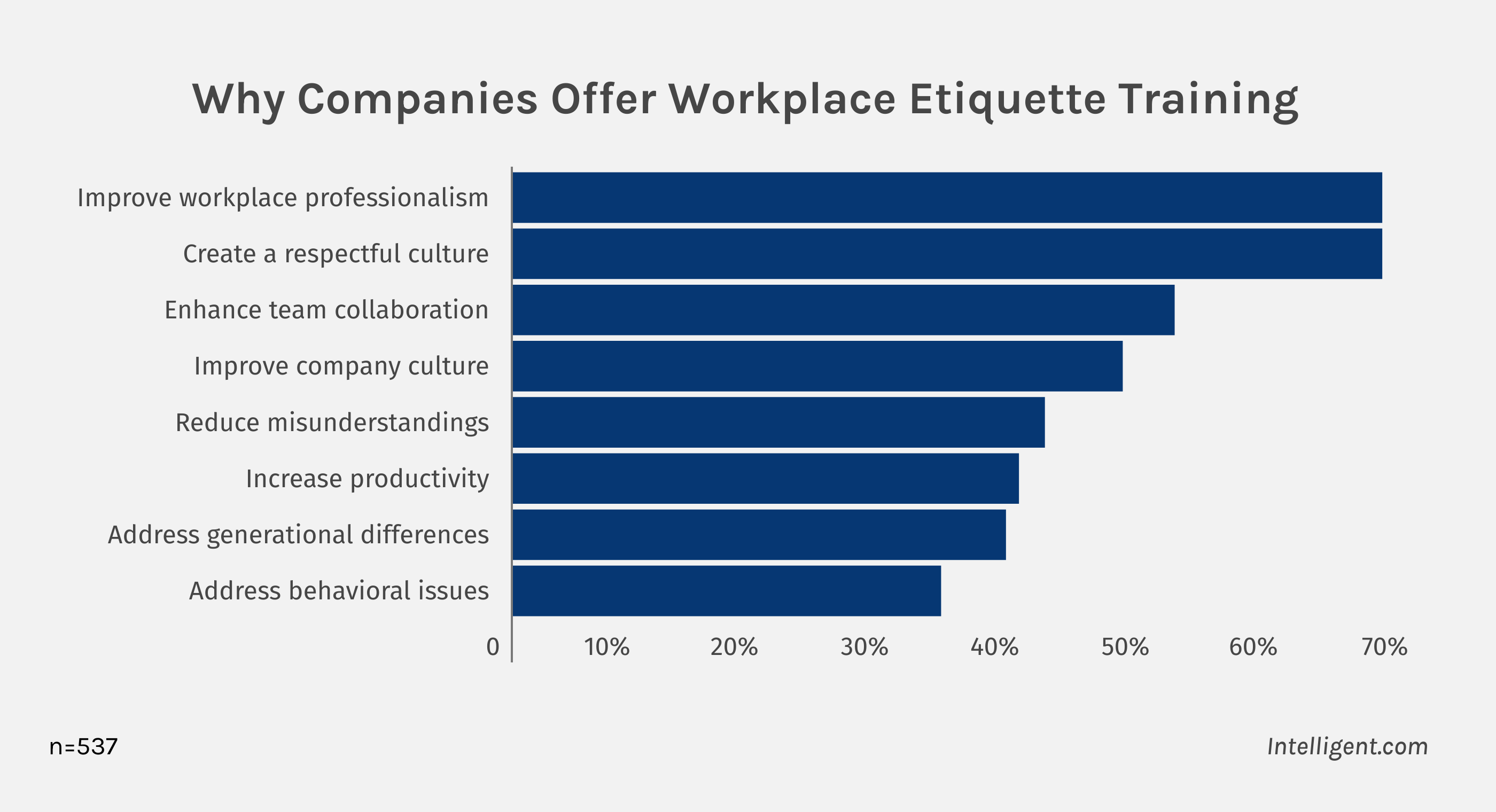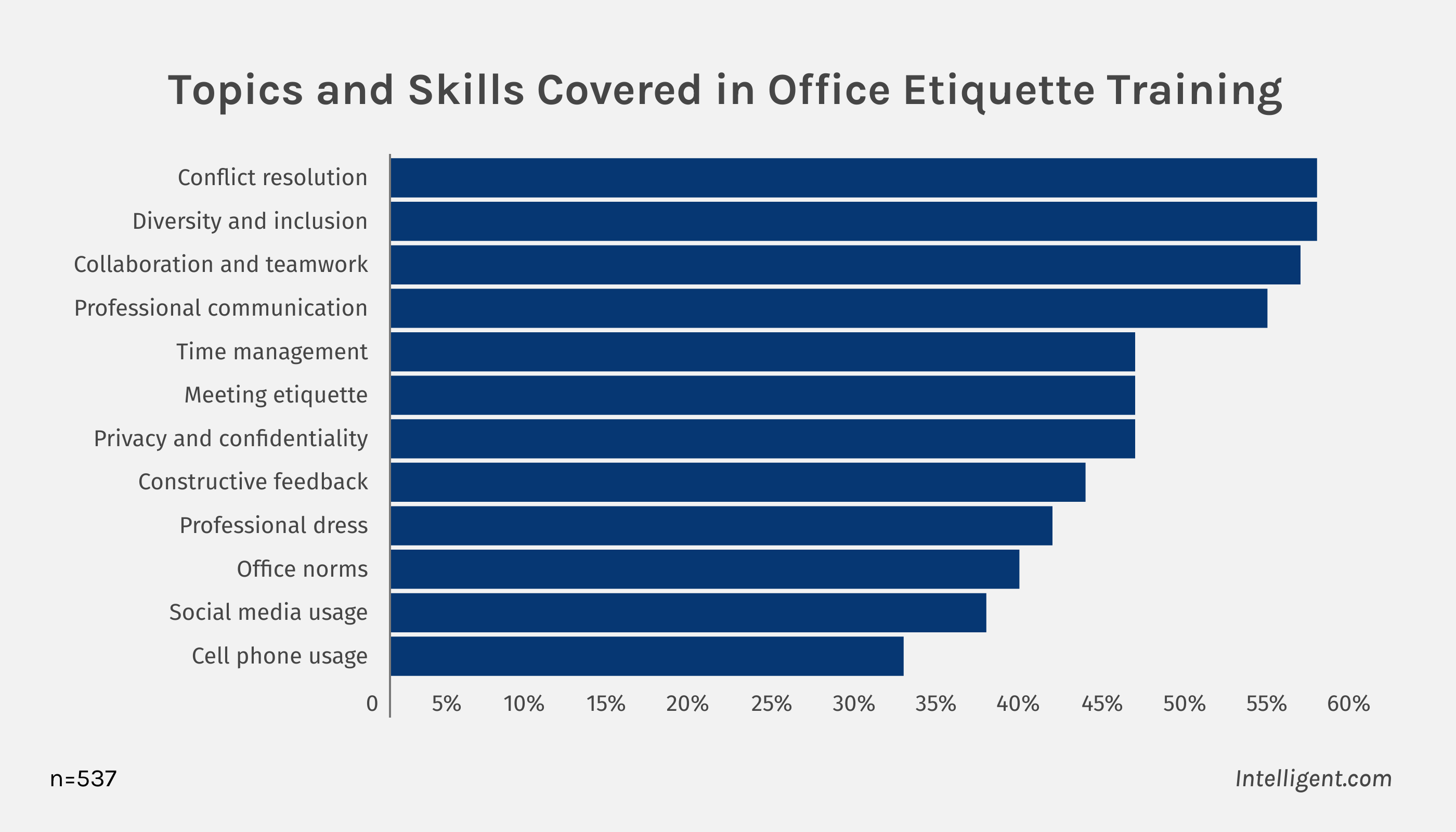Employers have noted that new hires who recently graduated from college are struggling with professionalism in areas like communication, receiving feedback, and appropriate workplace conversation.
To find out how business leaders are addressing professionalism issues within this new cohort of employees, including whether they are offering workplace etiquette courses, in October Intelligent.com surveyed 1,000 managers.
Key findings:
- 81% of business leaders say recent college graduates need workplace etiquette training
- Managers say top issues for recent college graduates are the ability to take constructive criticism, proper cell phone use, and conflict resolution
- Half of employers currently or plan to offer workplace etiquette training
- Majority of companies use etiquette training to improve professionalism and productivity
- Nearly all companies that have implemented this training say it’s been a success
81% of Business Leaders Say Recent College Grads Would Benefit From Workplace Etiquette Training
Based on their experiences with recent college graduates, 33% of managers say recent college graduates definitely need workplace etiquette training, while 48% say they probably do.
Employers at companies that operate on a fully in-person basis are slightly more likely to identify a need for etiquette training. Eighty-three percent of managers at companies with fully in-person attendance say recent college grads definitely or probably need etiquette training, compared to 79% of managers at hybrid companies and 76% of managers at fully remote companies.

“Companies with in-person work environments are naturally more likely to reveal any perceived gaps in professionalism because employees are having constant face-to-face interactions with each other,” says Huy Nguyen, Intelligent.com’s chief education and career development advisor.
“Remote work can mask certain deficiencies, but In a physical office setting, managers and other employees observe firsthand how new hires handle conflicts, respond to feedback, and manage their responsibilities in a shared workspace. As more companies push return-to-office mandates, expectations and scrutiny around professional workplace etiquette will also rise.”
Taking constructive criticism, and understanding cell phone etiquette are the biggest issues for recent college grads
When asked which workplace skills recent college graduates struggle with, 56% of managers say these employees are somewhat incompetent or highly incompetent at taking constructive criticism. Fifty-one percent of managers also identify understanding cell phone etiquette in the workplace as an area where recent college graduates are somewhat or highly incompetent.
A significant number of managers also label recent college graduates incompetent in several areas, including addressing and resolving conflict (48%), dressing professionally (44%), exercising common sense (44%), and keeping controversial topics out of the workplace (43%). Other areas of concern include personal-professional separation (42%), professional communication—such as writing emails, answering phones, and public speaking (40%)—arriving on time for work, meetings, and appointments (41%), and time management (41%).

Nguyen points out two key reasons for these struggles among new hires.
“Due to the pandemic, many recent college graduates spent a significant portion of their college education in virtual environments,” Nguyen says. “This limited their exposure to the interpersonal dynamics of in-person workspaces where soft skills such as communication, conflict resolution, and time management are developed through direct experience.”
Nguyen adds, “Recent grads have spent most of their lives in academic institutions that focus more on theoretical knowledge and inherently give less exposure to practical skills needed to be successful in the workplace. Leaving a structured environment with clear and constant guidance to enter the professional workplace where they are expected to be more autonomous and deal with ambiguity can be a difficult transition.”
However, there are ways that recent graduates and current students can better prepare themselves for the workforce.
“Participating in internships, part-time jobs, or even volunteer work can help students develop essential skills such as communication, collaboration, and time management,” Nguyen says. “Many professionals also realize that generational challenges exist and are willing and motivated to help young workers succeed as they were once in similar situations in their career journey.”
Majority of Employers Currently or Plan to Offer Etiquette Training
One-third of managers say their company currently offers workplace etiquette training. One in five say their company will begin providing workplace etiquette training in the future, most likely before the end of 2024 (20%) or in 2025 (73%).
There are multiple benefits to offering etiquette training, according to Nguyen.
“Having a formal program specific to a company helps to provide transparency, set clear expectations, and can help bridge the gap between recent graduates’ educational experience and the professional skills and procedures needed to thrive in the workplace,” Nguyen says. “This formal training, along with support and mentorship from their managers, can foster better communication and build a more collaborative work environment that helps new hires understand professional behavioral norms and workplace culture.”
Etiquette courses strive to improve workplace professionalism and increase productivity
When asked about the reasons for implementing workplace etiquette training courses, 67% of managers say their company implemented them to improve workplace professionalism and encourage a respectful work environment.
Other top reasons managers identified for providing workplace etiquette training include enhancing team collaboration (51%), aligning with company culture (47%), reducing misunderstandings among employees (41%), and increasing productivity (39%).

The skills covered in office etiquette classes largely align with these goals. The most common topics covered in workplace etiquette training include conflict management and resolution (56%) diversity and inclusion (56%), collaboration and teamwork (55%), professional communication (53%), time management (45%), meeting etiquette (45%), and privacy and confidentiality (45%).

Among the one-third of companies that are currently offering workplace etiquette training, the majority say it’s been highly successful (19%) or somewhat successful (72%).
Methodology
This online poll was commissioned by Intelligent.com and conducted on Pollfish in October 2024. In total, 1000 business leaders completed the survey.
Demographic criteria and screening questions were used to ensure qualified respondents. This criteria included age (28+), household income (>$75,000), organizational role (group manager, senior manager, manager, or program manager), company size (>11), and education (bachelor’s degree or higher).